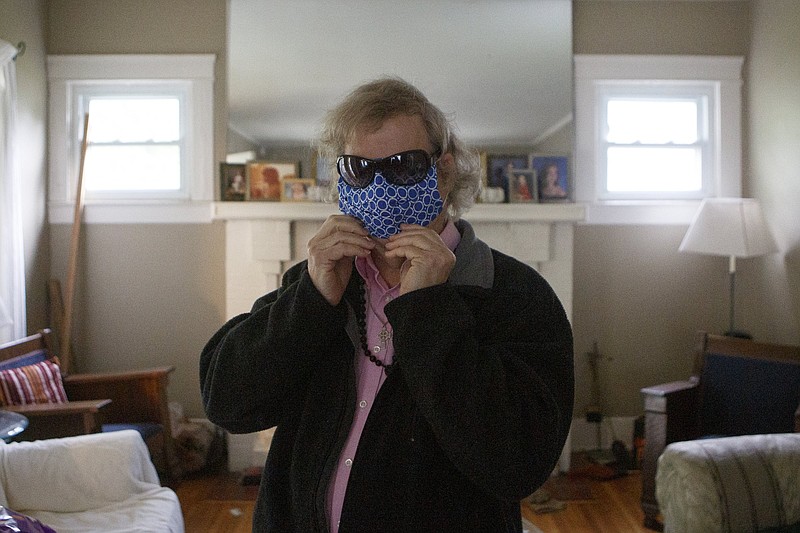As social distancing requirements are increasingly eased and people are venturing out in public more often, some are questioning when, how and where they should wear masks.
The U.S. Centers for Disease Control and Prevention's recommendations related to masks have changed as more information has become known regarding how the disease spreads.
The Times Free Press asked local officials and compiled information from the CDC to answer frequently asked questions concerning the latest recommendations for the use of cloth masks to prevent community spread of COVID-19.
Q. Who should wear a mask?
A. The CDC recommends that everyone wear cloth masks when they leave home, regardless of whether they have a fever or other symptoms of COVID-19. Masks should not be placed on kids younger than age 2, or on people who have difficulty breathing or removing the mask themselves. Medical masks, surgical masks and respirators such as N95 masks that are considered personal protective equipment should be worn by medical professionals and first responders.
Q. Why should I wear a cloth face mask?
Evidence shows that people with COVID-19 can spread the coronavirus even if they show no symptoms. Wearing a cloth face mask over the nose and mouth prevents a person who may not be aware that they have COVID-19 from spreading the virus through respiratory droplets released when they cough, sneeze or talk. If everyone wears a mask when out in public, community exposure to the coronavirus is reduced, according to the CDC.
Q. How do I wear my mask?
A. The CDC recommends cleaning hands with soap and water or alcohol-based hand sanitizer immediately before putting on the mask, after touching or adjusting it and after taking it off. Fully cover the nose and mouth and be sure it fits snugly on the sides of the face with no gaps. Tie or otherwise secure the mask in a way that prevents it from slipping. Make sure the mask does not cause you to have trouble breathing. Avoid touching the front of the mask and do not put it around your neck or forehead.
Q. Should I wear a mask to run on a street or hike on a trail where I will likely pass other people?
A. "Wearing a mask while running may present a breathing hazard for some, so caution should be taken if a runner chooses to do this," said Tom Bodkin, public information officer for the Chattanooga-Hamilton County Health Department. "Running outdoors alone away from people should not present a problem.
"If a runner thinks that they may come into close proximity to other people, they should consider a mask. Perhaps keeping the mask handy and donning it when approaching other people might be a solution. Consider choosing running routes that are less crowded. If running with a partner or group, practice social distancing before and after the run, but space at least double the recommended 6 feet when running single file."
He said the same recommendations apply for hiking, especially keeping a mask handy for when you approach other people.
Q. Do my children need to wear masks? If so, when is that necessary?
A. "Children are safest when playing within their family or domestic unit, in which case they wouldn't need a mask," Bodkin said. "If you feel your child over 2 years old needs to wear a mask, they should be instructed on covering the nose and mouth to prevent the spread of the virus."
Masks should not be used on children younger than 2 years, and children with a history of asthma may be at more risk when wearing one than going without, he said.
Q. How often should I wash my cloth face covering?
A. Cloth face coverings should be washed daily or when soiled. Laundry instructions would depend on the mask material, but generally they should be washed with water and mild soap, dried in a hot dryer and stored in a clean bag or container, according to the CDC.
Q. Can I share a mask with someone else?
A. Do not share masks with others unless they have been washed and dried first, and no one else should handle your face covering, the CDC says.
Q. Where can I get a mask?
A. The Health Department has cloth face coverings provided by Tennessee Gov. Bill Lee. They can be picked up in bins at the department's 3rd Street Health Center, 921 E. Third St., while supplies last. You can also make your own.
Q. Should I wear a mask in public restrooms?
A. "If people are in a public restroom, it's most likely because they are in a restaurant, business, or establishment where they should already be wearing a face covering," said Bodkin, adding that people should not avoid restrooms if their hands need washing. "While one cannot wear a mask while eating at a restaurant, a person could put it on to walk through the restaurant to get to the bathroom, while in the bathroom and to return to their table.
"In any case, it would be advisable to wear a face covering while in public bathrooms, even while alone. Someone could have coughed or sneezed in the bathroom shortly prior to your arrival."
Q. Can I be forced to leave a business for refusing to wear a mask?
A. Tennessee and the city of Chattanooga do not have laws requiring people to wear masks inside businesses, said Chattanooga Assistant City Attorney Melinda Foster, but to her knowledge there is no law that prevents private business from requiring patrons to wear masks or refusing entry to people who do not comply, as long they do not break any other laws by doing so such as discriminating against a particular group.
Email Emily Crisman at ecrisman@timesfreepress.com.
